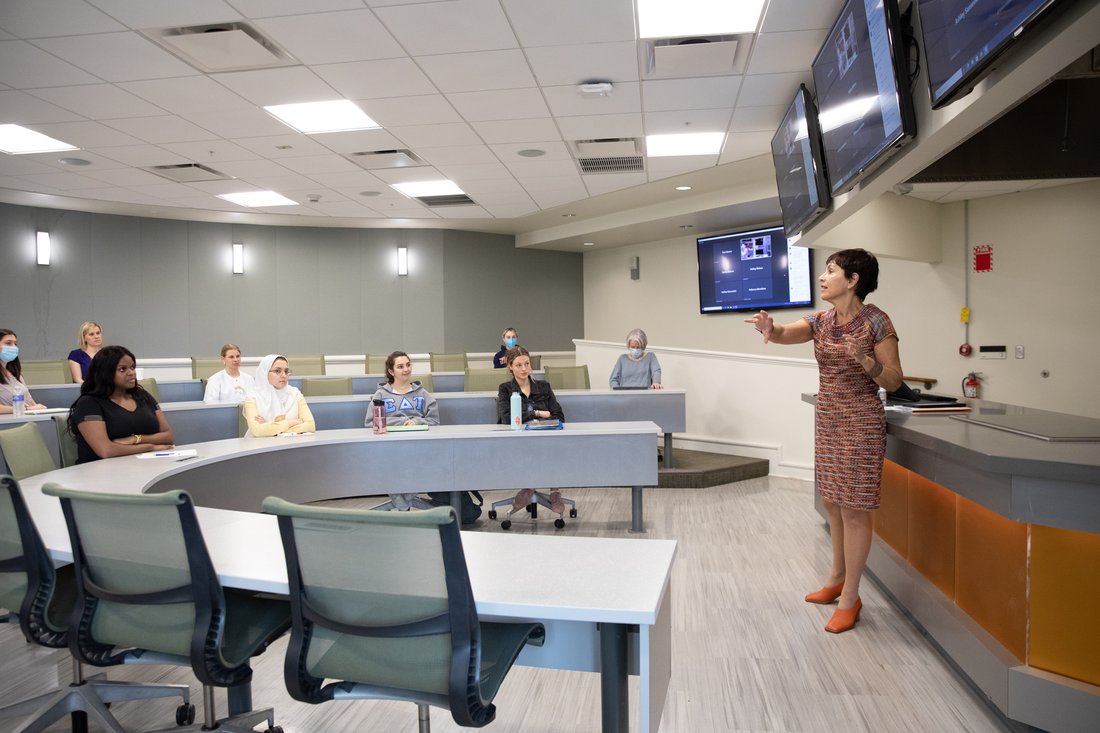
David B. Falk College of Sport and Human Dynamics
Curriculum
The Nutrition B.S. includes coursework in:
- Sciences: chemistry, biology, anatomy, physiology and biochemistry.
- Food: safety, science, systems and meal management.
Students also study nutrition in the health and lifespan, clinical nutrition therapy, community nutrition, nutrition education and counseling.
The Didactic Program in Dietetics at Syracuse University is accredited by the Accreditation Council for Education in Nutrition and Dietetics (ACEND) of the Academy of Nutrition and Dietetics (120 South Riverside Plaza, Suite 2190, Chicago, IL 60606-6995, 1.800.877.1600 ×5400). Our program is granted full accreditation through June 30, 2029.
The Nutrition B.S. prepares alumni to work in a variety of health and health promotion fields, many as registered dietitians. The Nutrition Science B.S. explores the biological and physical sciences to prepare alumni for postgraduate work in medicine, dentistry, education or health care, or to work for major food or pharmaceutical companies.
You must complete a supervised dietetic internship and at least a master’s degree to be eligible to take the Commission on Dietetic registration (CDR) credentialing exam to become a registered dietitian nutritionist (RDN). To learn more, visit our Program Handbook.
The internship and master’s degree can be completed separately or through a combined program, like our Nutrition Science M.A.
Dietetic Internship Program: Using a centralized application service, you will match to a dietetic internship. Syracuse University has high match rates consistently exceed national averages, highlighting our commitment to your career goals.
Learn more about the Dietetic Internship Program at Syracuse University.
Licensure/Certification: In most states, graduates also must obtain licensure or certification to practice. For more information about state licensure requirements visit the Academy of Nutrition and Dietetics website.
For more information about educational pathways to become a RDN visit the Academy of Nutrition and Dietetics website.
Extracurricular Opportunities
Practice Nutrition in the Community
Take nutrition to the local community by joining community partnership programs through the Syracuse University Shaw Center:
- Provide tutoring and nutrition education to elementary school students with Books & Cooks.
- Provide hands-on, nutrition-focused STEM lessons to high schoolers with Food Busters.
- Teach nutritious food choices and cooking skills to high schoolers with Cooking on the Hillside.
On campus, Syracuse University is home to more than 300 extracurricular groups, including nutrition student-led organizations like Nutrition Education and Promotion Association (NEPA) and Orange Wrap.
Experience Nutrition and Food Around the World
Consistently ranked among the top 25 international education providers in the U.S., Syracuse University Abroad gives you short- and long-term options—over 100 programs in 60 countries, from internships, community engagement projects, and language study at all levels. In nutrition, you can study health care and families in India, food and culture in Italy, drug policy in the Netherlands, health education in South Africa, health policy in Switzerland, and social policy and public health in the United Kingdom, to name a few.
Make Your Mark in Research
As a nutrition student, you can engage in independent and faculty mentored research projects. Gain experience collecting and analyzing data. You can even publish as an author or co-author on scholarly articles and present your findings at conferences.
Hone your skills in on-campus labs using medical-grade equipment and technology that mirrors—or exceeds—what is found in medical facilities, professional sports, the military, and health and wellness settings. Our Nutrition Assessment, Consultation and Education (ACE) Center is a hands-on learning laboratory to prepare students with traditional and emerging professional competencies critical to effective nutrition practice.
Launch Your Career in Nutrition
Most commonly, our students choose to become registered dietitian nutritionists (RDNs).
Alternatively, the nutrition science B.S. is also an excellent foundation for other graduate education, such as:
- Allied health: Medicine, dentistry, physical therapy, and others
- Biomedical research
- Pharmaceuticals
Or you might choose to pursue entry-level positions in:
- Business: Medical and food science research and development, quality control, employee wellness programming
- Research and education: Nutrition, biomedical, metabolic, or food science research, teaching, curriculum development, program administration
- Food and nutrition management: Food services, wellness programming, nutrition planning, health and lifestyle coaching, agriculture
Learn more about this program

